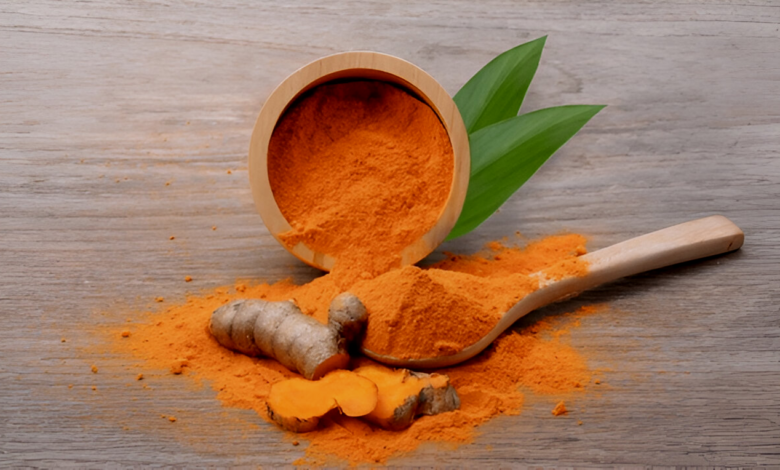Turmeric & Its Health Benefits: How to Use It Daily
Discover the health benefits of turmeric, how to use it daily, and tips to incorporate this golden spice into your routine for better wellness.

Turmeric, a golden-hued spice derived from the root of the Curcuma longa plant, has been a cornerstone of traditional medicine and culinary practices for centuries. Renowned for its vibrant color and earthy flavor, turmeric is more than just a kitchen staple—it is a powerhouse of health benefits. The active compound in turmeric, curcumin, is celebrated for its potent anti-inflammatory, antioxidant, and antimicrobial properties. From boosting immunity to supporting brain health,has earned its reputation as a natural remedy for a wide range of ailments. In this article, we will explore the myriad health benefits of turmeric, delve into the science behind its healing properties, and provide practical tips on how to incorporate this wonder spice into your daily routine.
As we conclude, it is clear that is not just a spice but a natural elixir for overall well-being. Its versatility in both culinary and medicinal applications makes it a valuable addition to any lifestyle. Whether you choose to sprinkle it on your meals, brew it into a soothing tea, or take it as a supplement, the benefits of are undeniable. By incorporating this golden spice into your daily routine, you can harness its healing powers and take a proactive step toward better health. Embrace the wisdom of ancient traditions and let be your ally in achieving a balanced and vibrant life.
The Health Benefits of Turmeric
Turmeric’s health benefits are vast and well-documented, making it one of the most studied spices in the world. At the heart of its therapeutic properties lies curcumin, a bioactive compound that gives its distinctive yellow color and potent health benefits. Curcumin is a powerful antioxidant that helps neutralize free radicals, reducing oxidative stress and preventing cellular damage. This property alone makes a valuable tool in combating chronic diseases such as cancer, heart disease, and diabetes.
In addition to its antioxidant capabilities, curcumin is a natural anti-inflammatory agent. Chronic inflammation is a root cause of many modern ailments, including arthritis, metabolic syndrome, and even neurodegenerative diseases like Alzheimer’s. By inhibiting inflammatory pathways in the body, can help alleviate symptoms and reduce the risk of these conditions. Studies have shown that curcumin’s anti-inflammatory effects are comparable to some pharmaceutical drugs, but without the harmful side effects.
Turmeric also plays a significant role in supporting brain health. Curcumin has been found to cross the blood-brain barrier, where it can enhance brain function and protect against cognitive decline. It boosts levels of brain-derived neurotrophic factor (BDNF), a protein that promotes the growth and survival of neurons. Low levels of BDNF are linked to depression and Alzheimer’s disease, making a promising natural remedy for mental health and cognitive longevity.
The spice is equally beneficial for heart health. Curcumin improves the function of the endothelium, the lining of blood vessels, which is crucial for regulating blood pressure and preventing blood clots. It also reduces levels of LDL cholesterol and triglycerides, both of which are risk factors for heart disease. By supporting cardiovascular health, can help you maintain a strong and resilient heart.
Turmeric’s antimicrobial properties make it a natural ally in fighting infections. It has been used for centuries to treat wounds, prevent infections, and boost immunity. Modern research confirms that curcumin can inhibit the growth of bacteria, viruses, and fungi, making it a valuable tool in combating infections and supporting overall immune function.
How to Use Turmeric Daily
Incorporating into your daily routine is easier than you might think. One of the simplest ways to enjoy its benefits is by adding it to your meals. Turmeric pairs well with a variety of dishes, from soups and stews to rice and vegetables. A pinch of can elevate the flavor and nutritional value of your food. For a more concentrated dose, consider making golden milk, a traditional Ayurvedic beverage made with , milk (or a plant-based alternative), and a touch of honey or black pepper. Black pepper is particularly important because it contains piperine, a compound that enhances the absorption of curcumin by up to 2,000%.
Another popular way to consume is by brewing it into tea. Simply steep a teaspoon of powder or grated fresh root in hot water, add a squeeze of lemon and a dash of honey, and enjoy a soothing and health-boosting drink. Turmeric tea is especially beneficial for digestion and can help soothe an upset stomach.
For those who prefer a more convenient option, supplements are widely available. When choosing a supplement, look for one that contains black pepper or piperine to ensure optimal absorption. It’s important to follow the recommended dosage and consult with a healthcare professional before starting any new supplement regimen.
Turmeric can also be used topically to promote skin health. Its anti-inflammatory and antimicrobial properties make it an effective remedy for acne, eczema, and other skin conditions. You can create a simple face mask by mixing powder with yogurt or honey and applying it to your skin. Leave it on for 10-15 minutes before rinsing off for a natural glow.
Potential Side Effects and Precautions
While turmeric is generally safe for most people, it’s important to be aware of potential side effects and precautions. High doses of turmeric or curcumin supplements may cause digestive issues such as nausea, diarrhea, or stomach upset. Individuals with gallbladder disease or those taking blood-thinning medications should exercise caution, as turmeric can increase the risk of bleeding. Pregnant and breastfeeding women should consult their healthcare provider before consuming large amounts of turmeric or taking supplements.
Read More: DIY Skincare: Natural Face Masks for Glowing Skin
Conclusion
In conclusion, turmeric is a remarkable spice with a rich history and a wealth of health benefits. Its active compound, curcumin, offers powerful anti-inflammatory, antioxidant, and antimicrobial properties that can support overall health and well-being. From boosting brain function to promoting heart health and enhancing immunity, is a versatile and natural remedy for a wide range of ailments.
By incorporating turmeric into your daily routine—whether through food, beverages, supplements, or topical applications—you can harness its healing powers and take a proactive step toward better health. As with any natural remedy, it’s important to use mindfully and consult with a healthcare professional if you have any concerns. Embrace the wisdom of ancient traditions and let be your ally in achieving a balanced and vibrant life.
FAQs
What is the best way to consume turmeric daily?
The best way to consume daily is by adding it to your meals, such as soups, stews, or rice. You can also make golden milk or turmeric tea for a more concentrated dose.
Can I take turmeric supplements instead of using the spice?
Yes, turmeric supplements are a convenient option, especially those containing black pepper or piperine to enhance absorption. Always consult a healthcare professional before starting supplements.
Are there any side effects of consuming too much turmeric?
High doses of turmeric may cause digestive issues like nausea or diarrhea. It may also interact with blood-thinning medications, so caution is advised.
How does turmeric benefit skin health?
Turmeric’s anti-inflammatory and antimicrobial properties make it effective for treating acne, eczema, and other skin conditions. It can be used topically in face masks.
Is turmeric safe for everyone?
While generally safe, turmeric may not be suitable for individuals with gallbladder disease or those on blood-thinning medications. Pregnant and breastfeeding women should consult a doctor before use.











